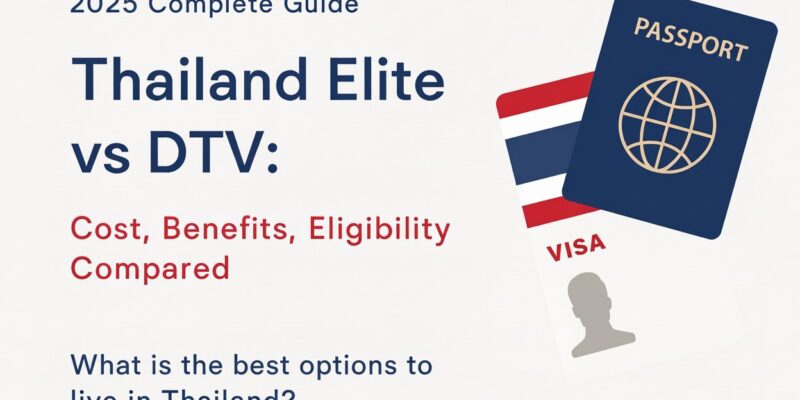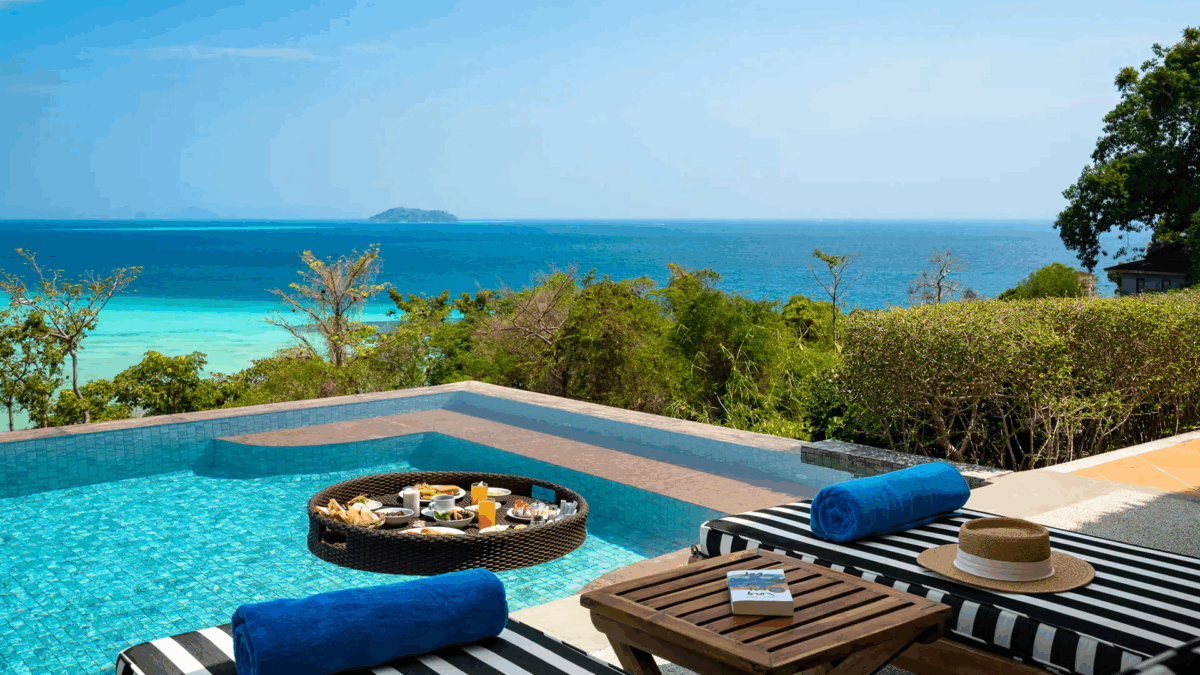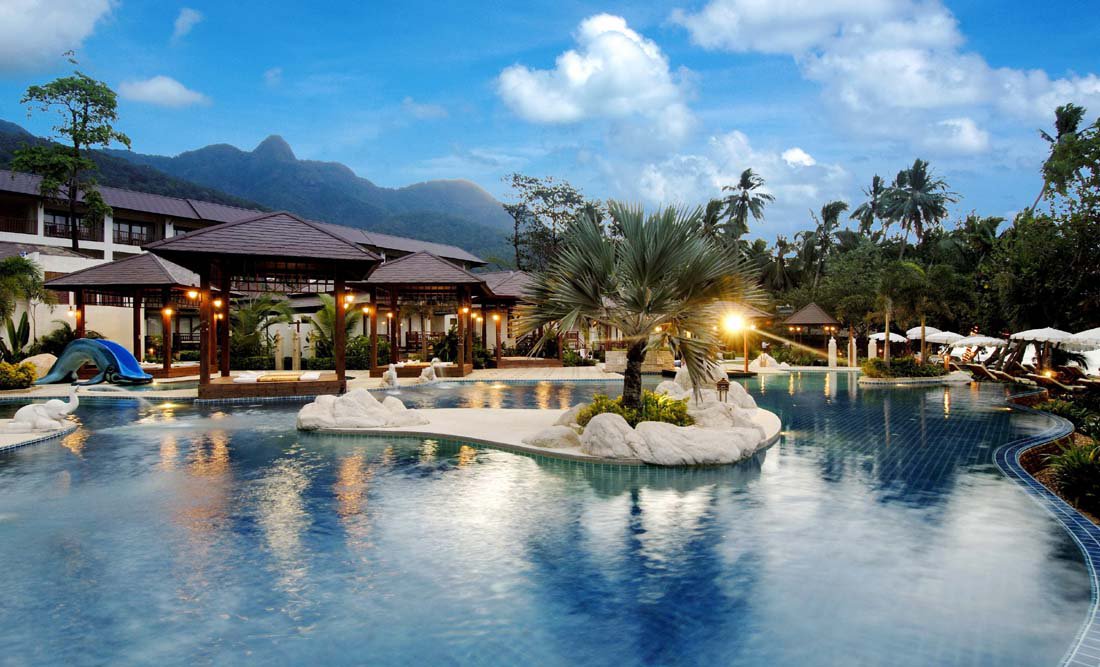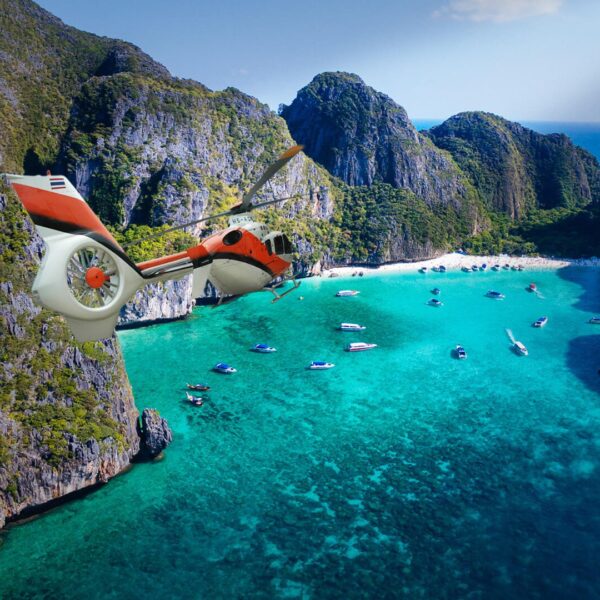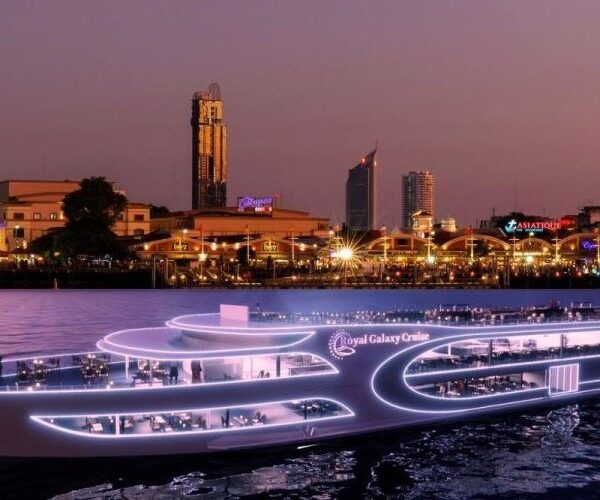Thailand Elite Visa vs DTV 2025 Guide: Costs & Benefits
Thailand Elite vs DTV: Cost, Benefits, Eligibility Compared
The essential takeaway: For long-term stays in Thailand, the Thailand Privilege Visa offers premium convenience with VIP airport services and up to 20-year validity for those investing 900,000 THB upfront, while the Destination Thailand Visa (DTV) provides digital nomads a budget-friendly 5-year option with 180-day stays, requiring 500,000 THB proof of funds but no local work permits. Choose Privilege for luxury, DTV for flexibility.
Choosing Thailand Elite Visa vs DTV feels overwhelming when you're dreaming of a hassle-free Thai lifestyle. This guide cuts through the confusion with a sharp comparison of costs, benefits, and eligibility – from driving license access to bank account privileges – while revealing hidden constraints no one talks about. Discover which visa truly unlocks your ideal 2025 escape: premium convenience with Thailand's VIP program or flexible digital nomad freedom with DTV's groundbreaking 180+180 day structure. Whether you're a wealthy retiree craving concierge services or a remote worker needing legal compliance, we'll highlight key differences in financial requirements, family inclusion, and long-term stability that eliminate administrative headaches.
- Understanding Thailand's long-stay visa landscape in 2025
- What Is the Thailand Privilege Visa (formerly Elite Visa)?
- What is the Destination Thailand Visa (DTV)?
- Deep Dive Into The Costs: A Financial Breakdown
- Eligibility and application process: who can apply and how?
- Benefits and lifestyle: What do you get with each visa?
- Practicalities of settling in: bank accounts and driving licenses
- The Bigger Picture: What About The Ltr Visa
- Which long-stay visa is the right choice for you in 2025?
Understanding Thailand's long-stay visa landscape in 2025
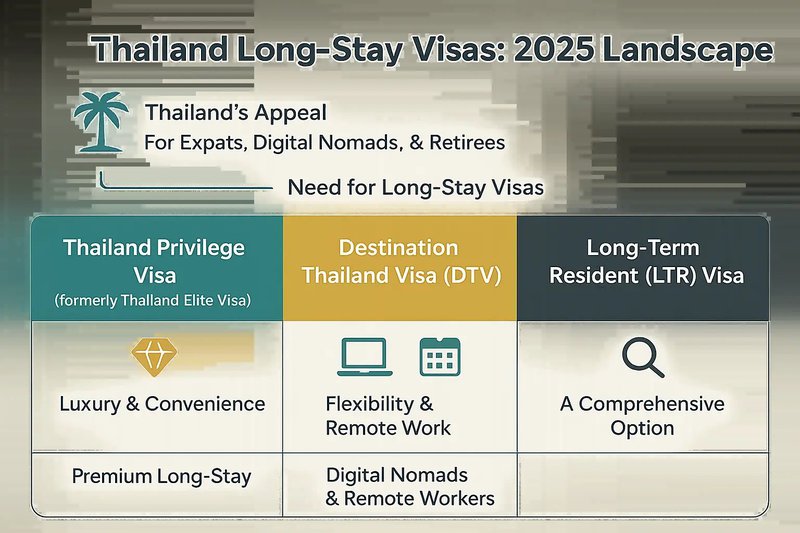
Thailand's growing appeal as a long-term destination for digital nomads, retirees, and expats has led to a surge in specialized visa options. Two programs dominate the 2025 market: the Thailand Privilege Visa (successor to the Thailand Elite Visa) and the Destination Thailand Visa (DTV). While both offer extended stays, their target audiences and benefits differ dramatically.
The Privilege Visa caters to high-net-worth individuals seeking luxury and convenience, with lifetime validity options and exclusive perks. In contrast, the DTV targets digital nomads and cultural enthusiasts through a more affordable entry cost, though with stricter activity limitations. For comprehensive comparison, we’ll also briefly reference the LTR (Long-Term Resident) Visa – a third option attracting skilled professionals and investors through 10-year residency and tax exemptions on foreign-sourced income.
Curious why 68,776 USD for 15 years of VIP treatment might actually save money long-term? Or how $500 in visa fees could limit your professional opportunities? Let’s explore the critical differences in cost, flexibility, and hidden advantages shaping Thailand’s residency landscape. Remember, official applications for the Privilege Visa must be submitted through Thailand Elite’s official portal to ensure authenticity and access to exclusive benefits like golf course privileges and personalized assistant services.
What Is the Thailand Privilege Visa (formerly Elite Visa)?
The Thailand Privilege Visa redefines long-term residency with a unique membership program offering multi-entry visas valid for 5 to 20 years. Unlike traditional visas, it eliminates the hassle of frequent renewals, making it ideal for frequent travelers or those seeking extended stays without immigration hassles.
Managed by Thailand Privilege Card Co., Ltd., a government-backed entity, this visa prioritizes VIP experiences—think fast-track airport lanes, personalized assistance, and exclusive perks. It’s tailored for affluent individuals, retirees, and families valuing convenience, luxury, and seamless bureaucracy.
Membership Tiers & Benefits
Choose from five tiers, each with escalating validity and privileges:
- Bronze: 5 years, ฿650,000 (~$19,000 USD). Basic access.
- Gold: 5 years, ฿900,000 (~$24,760 USD). Adds 20 annual points for custom benefits.
- Platinum: 10 years, ฿1.5M (~$41,265 USD). 35 points/year + family inclusion.
- Diamond: 15 years, ฿2.5M (~$68,776 USD). 55 points/year.
- Reserve: 20 years, ฿5M (~$137,552 USD). 120 points/year; invite-only.
Key perks include 24/7 member support, health check-ups, airport fast lanes, and a points system for personalized benefits (golf, spa, cinema discounts). It simplifies bank account openings and streamlines processes like visa extensions.
Who Is It For?
Targeted at high-net-worth individuals, retirees, and families, this visa demands significant upfront investment but delivers unparalleled convenience. Eligibility requires a clean criminal record, no prior overstays, and a valid passport for at least one year.
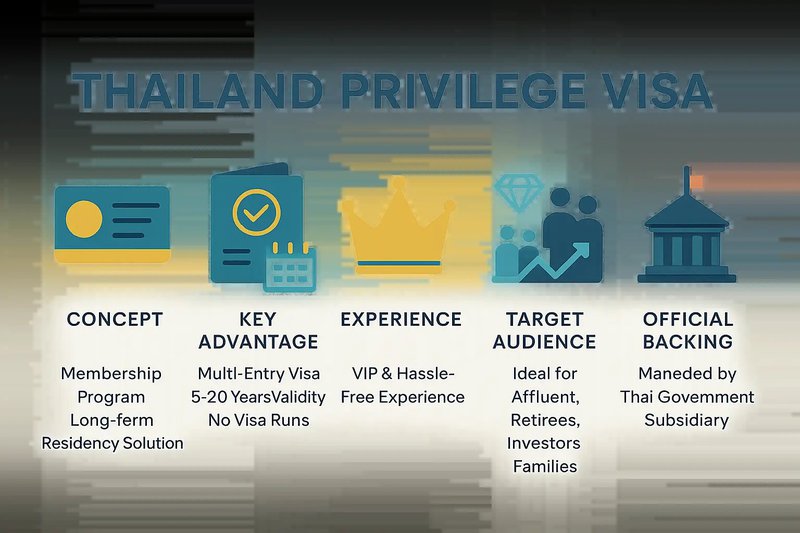
Ready to unlock premium residency? Apply now for a stress-free, luxurious stay in Thailand.
What is the Destination Thailand Visa (DTV)?
The Destination Thailand Visa (DTV) is a 5-year multiple-entry visa launched July 15, 2024, targeting digital nomads, remote workers, and cultural enthusiasts seeking extended stays in Thailand.
Eligibility Categories
Two main groups qualify:
- Remote Workers: Individuals employed by foreign entities (freelancers, remote employees) generating income outside Thailand, including entrepreneurs managing overseas businesses.
- Soft Power Participants: Those enrolling in Thai cultural programs like Muay Thai, cooking classes, wellness retreats, or annual events (e.g., Songkran festivals).
Key Features & Constraints
Holders receive 180 days per entry, extendable once for 180 days (total ~1 year continuously). Work for Thai employers or clients is strictly prohibited.
Applicants must prove 500,000 THB (~$16,000) in assets via a 6-month bank statement (crypto/investments excluded). Spouses and children under 20 can join via separate applications with proof of relationship and financial support.
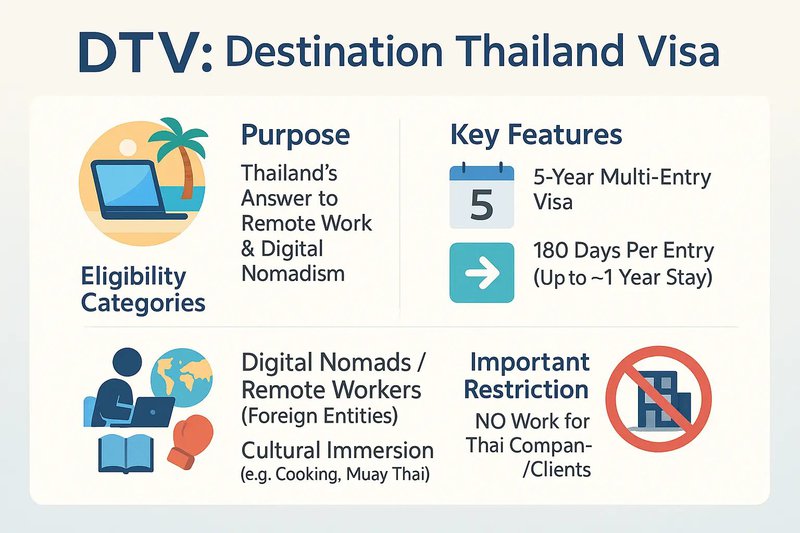
Applications require employment contracts (for remote work) or program enrollment letters (for cultural activities). The DTV must be applied for abroad via Thai embassies or the e-Visa portal. Stays over 180 days/year may trigger Thai tax residency, potentially applying local taxation to foreign-sourced income (double taxation agreements may reduce this).
| Feature | Thailand Privilege Visa | DTV |
|---|---|---|
| Target: High-net-worth individuals | Validity: 5-20+ years | Validity: 5 years |
| Stay: Continuous with annual extensions | Cost: 900,000 THB+ | Stay: 180+180 days/year |
| Work: No local work permit | Key: VIP airport services, concierge | Work: Remote work allowed |
| Dependents: Limited inclusion | Dependents: Spouse/children allowed |
Why choose between luxury and flexibility? Thailand's long-term visas serve distinct needs: Privilege Visa offers permanent VIP access for affluent travelers, while DTV enables digital nomads to work remotely. Both require financial proof (500k THB vs 900k+ THB), but only DTV permits foreign-remote work. Discover which visa better matches your lifestyle.
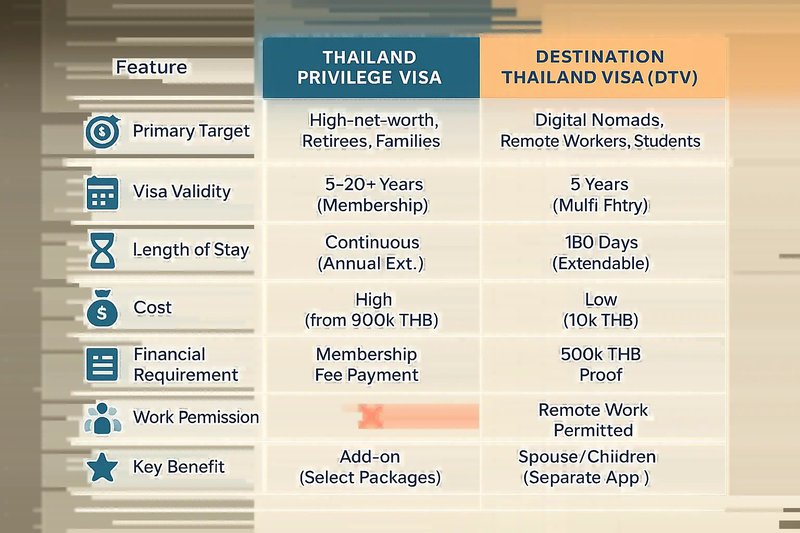
Ready to decide? Apply for Thailand Privilege Visa and enjoy exclusive privileges designed for discerning travelers.
Deep Dive Into The Costs: A Financial Breakdown
The Investment For The Thailand Privilege Visa
Why do high-net-worth individuals pay significantly more for the Thailand Privilege Visa? The answer lies in its unique value proposition. This program requires a one-time membership fee covering the entire visa duration, starting from Gold Membership (5 years): 900,000 THB (~$24,760) to Reserve Membership (20 years): 5,000,000 THB (~$137,552), accessible only by invitation.
Key details include a non-refundable 50,000 THB application fee, deductible from the total cost upon approval. Unlike traditional visas, this is an investment in premium benefits: unlimited airport fast lanes, personalized concierge services, and exclusive lifestyle perks. Consider it a payment for convenience and long-term stability.
- Gold Membership (5 years): 900,000 THB
- Platinum Membership (10 years): 1,500,000 THB (allows family members)
- Diamond Membership (15 years): 2,500,000 THB
- Reserve Membership (20 years): 5,000,000 THB (by invitation only)
The Cost Structure Of The Destination Thailand Visa (DTV)
At first glance, the DTV Visa seems more affordable: a flat 10,000 THB (~$275) fee. However, its hidden requirement could tie up your liquidity. Applicants must prove 500,000 THB (~$13,750) in a bank account for six months—funds that remain yours but must stay locked as proof of financial stability.
This visa suits digital nomads seeking temporary flexibility without upfront costs. Yet, while the DTV avoids large payments, it lacks the Thailand Privilege Visa’s lifetime privileges. Missed opportunities? Think access to premium healthcare, golf courses, and a dedicated concierge network—perks that justify the higher price for long-term residents.
Additional costs may apply for DTV extensions beyond 180 days, though specific fees aren’t outlined. The Privilege Visa, by contrast, eliminates recurring expenses through its one-time payment model.
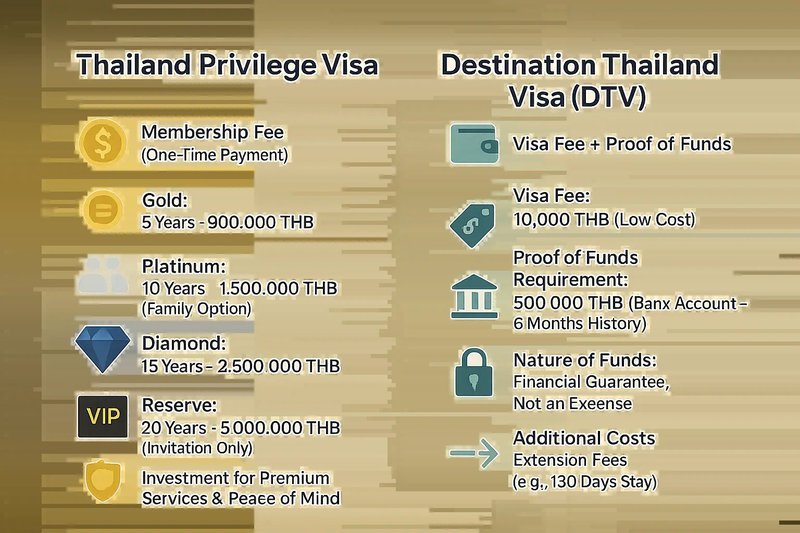
Ready to unlock hassle-free living in Thailand? Apply for the Thailand Privilege Visa and invest in a stress-free future.
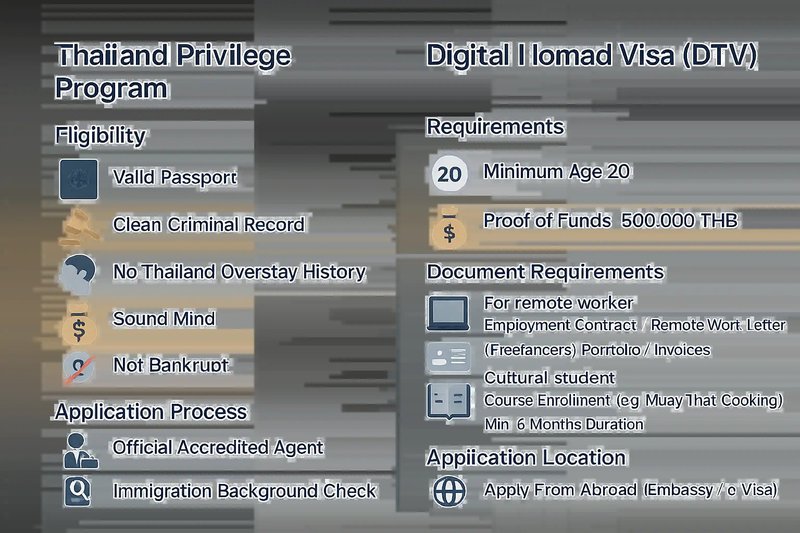
Eligibility and application process: who can apply and how?
Qualifying for the Thailand Privilege program
The Thailand Privilege Visa creates a Curiosity Gap by offering elite benefits through simplified administrative steps. Applicants need a valid passport for at least one year, a clean criminal record, and no overstay/ bankruptcy history. Mental capacity and non-North Korean nationality are also prerequisites.
Applications must go through official agents, which simplifies the process. These accredited agents handle document verification and submission. The process involves a 50,000 THB application fee (deductible from membership costs) and a 4-12 week background check. This includes verification through Thailand’s immigration police – a process that cannot be expedited.
This structure provides Loss Aversion: missing straightforward requirements risks losing your investment. Unlike other programs, Thailand Privilege offers 24/7 member support, reducing administrative stress for long-term residency seekers. The program also includes unique benefits like golf course access and cinema discounts absent in standard visa structures.
Meeting the criteria for the DTV
The DTV Visa requires applicants to be at least 20 years old. Documentation varies by category:
- Remote workers: Employment contract or freelance proof (portfolios/invoices)
- Cultural students: Enrollment in Muay Thai, cooking classes, or similar programs for minimum 6 months
Applicants must prove 500,000 THB in assets via official bank statements. Unlike Thailand Privilege, DTV applications must originate from abroad through Thai embassies or the e-Visa portal. This creates challenges for applicants already in Thailand.
This visa introduces Scarcity through strict deadlines: missing the 30-day payment window after approval forces a complete restart. Embassy requirements add complexity compared to Thailand Privilege’s in-country application option. The DTV’s focus on digital nomads and cultural learners reflects Thailand’s strategy to attract specific demographics.
| Criteria | Thailand Privilege | DTV |
|---|---|---|
| Financial Proof | 50,000 THB application fee (deductible) | 500,000 THB fixed assets |
| Application Location | Can apply from Thailand | Mandatory foreign submission |
| Background Check | 4-12 weeks | 30-day payment deadline |
| Bank Account Access | Direct facilitation | Implicit facilitation |
Both programs facilitate bank account opening and driver’s license processing. Thailand Privilege’s personalized services – including family member inclusion options and exclusive health benefits – create a Novelty factor that differentiates it from standard visa programs. The DTV’s affordability attracts budget-conscious applicants while maintaining long-term residency benefits.
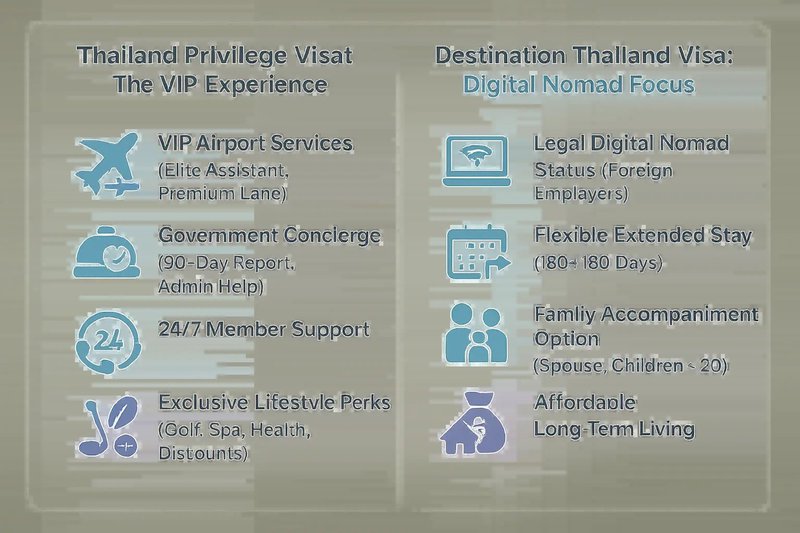
Benefits and lifestyle: What do you get with each visa?
The VIP experience of the Thailand Privilege Visa
Why do 80% of high-net-worth travelers choose Thailand Privilege Visa? The answer lies in exclusive benefits unavailable elsewhere. For a one-time payment between $19,000-$137,552 depending on duration, members gain:
- VIP airport services: Personal assistant meets you at arrivals, premium immigration lanes, and baggage assistance
- Government concierge: Handles 90-day reports, driver's license applications, and bank account setup automatically
- 24/7 Member Contact Center: Dedicated support for banking, healthcare, and administrative needs
- Luxury perks: Free golf courses, spa days, annual health check-ups, and 50% off at top hotels
These privileges aren't just convenience – they save 20+ hours annually compared to standard visa holders. Members also receive exclusive access to premium airport lounges and priority processing for official paperwork.
The flexibility and purpose of the Destination Thailand Visa
For digital nomads seeking affordable long-term stays, the DTV offers unique advantages. At $500 visa fee plus $15,000 liquid funds, it provides:
- 180+180 days: Legal 360-day annual stay with work-from-Thailand flexibility
- Workcation approved: Officially permits remote work for foreign companies
- Family inclusion: Spouse and children under 20 can apply separately
- Cultural immersion: Access to Muay Thai classes and Thai cooking courses
This visa's novelty lies in its digital nomad focus – a 2024 government initiative responding to Thailand's booming remote work economy. While lacking luxury amenities, it offers critical advantages for budget-conscious professionals seeking extended stays.
| Feature | Thailand Privilege | DTV |
|---|---|---|
| Cost | $19,000-$137,552 | $500 + $15,000 funds |
| Stay Duration | 5-20 years validity | 180+180 days |
| Driver’s License | Government-concierge assistance | Standard process |
| Bank Account | Guaranteed support | Standard procedure |
| Work Rights | Unrestricted | Foreign company only |
| Luxury Benefits | 20+ exclusive perks | None |
Ready to choose? Apply for Thailand Privilege Visa now – our exclusive 20-year "Reserve" membership sells out within weeks. For workcation needs, the DTV remains ideal – but remember: both require immediate action to secure your Thai residency rights.
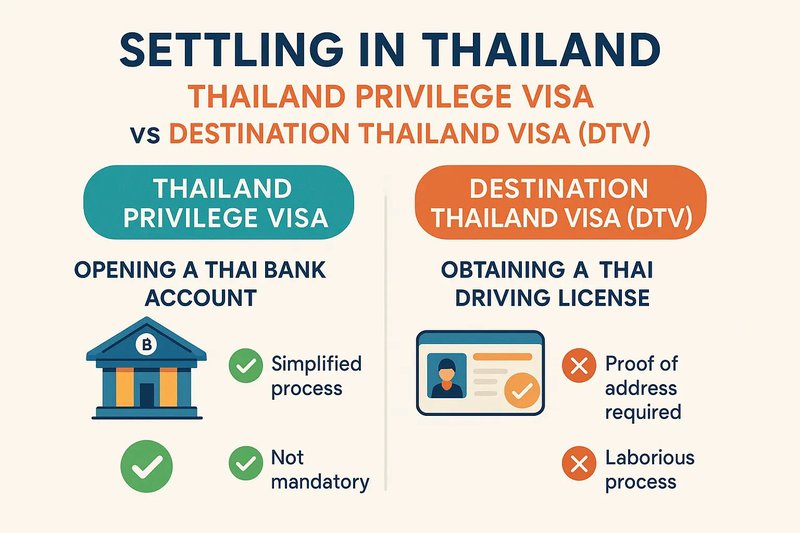
Practicalities of settling in: bank accounts and driving licenses
Opening a Thai bank account
For long-term residents, Thailand Privilege Visa holders benefit from a streamlined banking experience. The program guarantees assistance through its concierge service, guiding members to open multi-currency accounts with major banks like Bangkok Bank and Kasikorn. This advantage becomes critical amid recent banking restrictions: since January 2023, Bangkok Bank refuses new accounts for tourists and DTV holders. Even existing accounts face freezes due to tightened KYC rules following the May 2025 Pattaya fraud incident.
By contrast, DTV holders face uncertainty. While eligibility exists, success depends on the branch’s familiarity with DTV requirements. Many applicants report visiting multiple banks to open accounts, risking delays and administrative hurdles. Privilege members avoid these frustrations through concierge-facilitated appointments and document preparation, a service now worth its weight in gold as Bangkok Bank tightens controls.
Obtaining a Thai driving license
The Thailand Privilege Visa simplifies license acquisition through its Elite Personal Liaison (EPL) service, relaunching June 16, 2025. This concierge support handles document preparation and schedules appointments at the Department of Land Transport, eliminating language barriers and administrative roadblocks. For Platinum+ members, these services cost 3,000 THB per session or 2 privilege points – a small price compared to the headaches faced by DTV holders.
DTV applicants must navigate the process independently. Requirements include a health certificate, residence report, and multiple visits to Department of Land Transport offices. While possible, the process consumes time and exposes applicants to inconsistent enforcement. Reserve members (5M THB investment) receive comprehensive support, including 90-day report assistance – a critical advantage amid rising administrative complexity.
Apply for Thailand Privilege Visa to access guaranteed banking privileges and hassle-free license processing – advantages that become essential in Thailand’s evolving regulatory landscape.
The Bigger Picture: What About The Ltr Visa
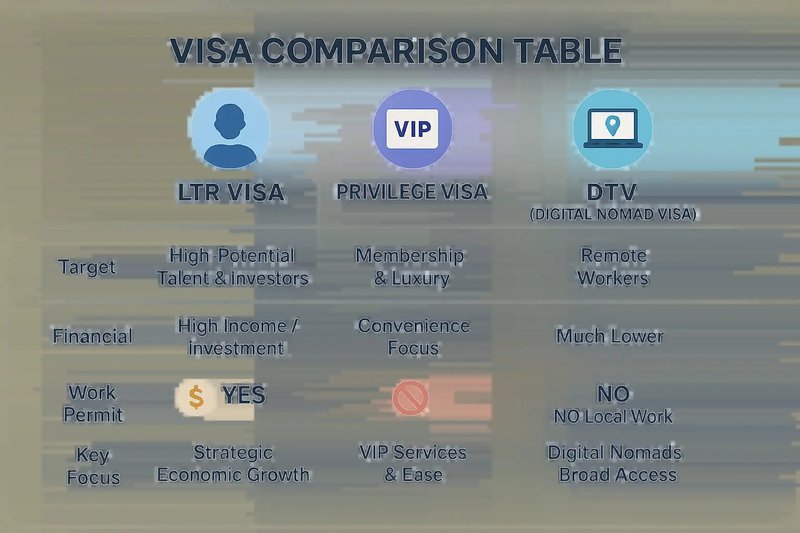
The Long-Term Resident (LTR) Visa is a premium option targeting high-net-worth individuals and skilled professionals. Unlike the Thailand Privilege Visa (formerly Elite) or DTV, it offers a 10-year stay with renewable five-year terms, focusing on economic contributions rather than luxury or remote work flexibility.
- LTR vs. Privilege Visa: The LTR demands strict financial thresholds—like $80,000 annual income or $1M in assets—plus investments in Thai assets. It grants work permits and tax breaks, while the Privilege Visa prioritizes lifestyle perks (e.g., airport fast-track, healthcare) without work rights.
- LTR vs. DTV: The LTR caters to high earners (minimum $80,000/year) with tax exemptions and investment obligations. The DTV, at $500/year, targets remote workers with lower income proof ($15,000+) but bans local employment.
Why does this matter? If you’re seeking tax advantages or plan to invest in Thailand, the LTR’s 17% income tax cap for skilled professionals or exemption on foreign earnings could save you thousands annually. However, its high entry barriers make it inaccessible for most compared to the DTV’s affordability or Privilege Visa’s convenience.
Ready to explore long-term options? Apply for Thailand’s official long-stay program or consult the BOI for LTR specifics.
Which long-stay visa is the right choice for you in 2025?
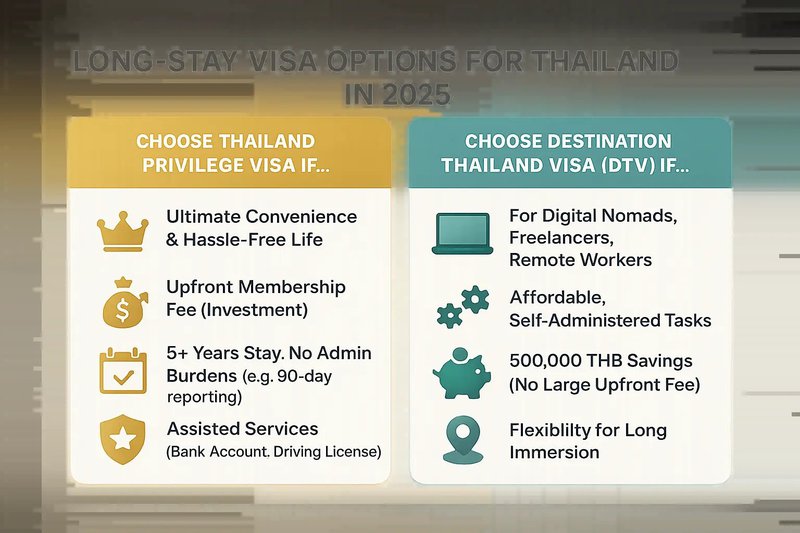
Choose the Thailand Privilege Visa if…
- You value ultimate convenience and a hassle-free life in Thailand above all else.
- You have the capital for the upfront membership fee (ranging from $19,000 to $137,552) and see it as an investment in your quality of life.
- You plan a long-term stay (5+ years) and want to avoid all administrative burdens like visa runs or 90-day reporting.
- You want guaranteed, facilitated assistance for critical tasks like opening a bank account and getting a driving license.
Choose the Destination Thailand Visa (DTV) if…
- You are a digital nomad, freelancer, or remote worker needing a legal basis to live and work from Thailand.
- You’re looking for an affordable long-term option ($400–$500 visa fee) and are comfortable handling administrative tasks yourself.
- You meet the financial stability requirement (500,000 THB in savings) but prefer not to pay a large upfront fee.
- You want the flexibility to enjoy long periods of immersion in Thailand without visa renewals every 90 days.
Your next step for a long-term stay in Thailand
For those who prioritize a premium, streamlined, and truly worry-free experience, the Thailand Privilege program stands out as the ultimate solution. To explore the membership options and start your application through the official agent application website, you can get started today.
Apply for your long-term visa in Thailand at https://www.thailand-elite.com.
Thailand’s 2025 long-stay visas cater to distinct lifestyles: the Thailand Privilege Visa offers unmatched luxury and hassle-free convenience for high-net-worth individuals, while the DTV provides affordable flexibility for digital nomads and cultural enthusiasts. Both require financial stability but differ in validity, work permissions, and benefits. Choose based on your priorities—premium services or remote-work freedom—to unlock your ideal Thai residency.
FAQ
What is the difference between Thailand Privilege Visa (formerly Elite Visa) and Destination Thailand Visa (DTV)?
The Thailand Privilege Visa (formerly Elite Visa) and DTV cater to different demographics with distinct benefits. The Privilege Visa is a membership-based program offering multi-entry visas valid for 5-20 years, designed for high-net-worth individuals seeking premium services like VIP airport access, government concierge support, and lifestyle perks. Costs range from 900,000 THB (approx. $24,760) for 5 years to 5,000,000 THB (approx. $137,552) for 20 years. In contrast, the DTV targets digital nomads and cultural enthusiasts, providing a 5-year multi-entry visa with 180-day stays per entry (extendable once). It costs only 10,000 THB (approx. $275) but requires proof of 500,000 THB ($15,000) in savings. While the Privilege Visa emphasizes luxury and convenience, the DTV prioritizes affordability and flexibility for remote work or cultural immersion.
What are the key benefits of the Destination Thailand Visa (DTV)?
The DTV offers practical advantages for remote workers and cultural learners. It allows 180-day stays per entry with a one-time 180-day extension, enabling nearly a year of continuous residency. Holders can legally work remotely for foreign employers and participate in Thai cultural activities like Muay Thai or cooking classes. The visa supports family inclusion (spouse and children under 20) through separate applications. Its affordability—just 10,000 THB in fees—makes it accessible, though applicants must demonstrate financial stability with a 500,000 THB ($15,000) savings requirement. However, it prohibits working for Thai employers and mandates applying from abroad.
Is the Thailand Elite Visa being discontinued?
No, the Thailand Elite Visa has not been discontinued but rebranded as the Thailand Privilege Visa in 2025. It retains its core structure as a premium membership program with enhanced benefits, including a new points system for personalized perks. All existing memberships (Gold, Platinum, etc.) remain valid, and the program continues to target affluent individuals, retirees, and families seeking hassle-free, long-term stays with VIP services like airport fast-track lanes and dedicated concierge support.
How does the DTV compare to Thailand’s Long-Term Resident (LTR) Visa?
The LTR Visa is tailored for high-earning professionals and investors, offering a 10-year stay with tax incentives and work permits for Thai employers. It demands steep financial criteria, such as $80,000+ annual income or $1M in assets, and focuses on economic contribution. The DTV, by contrast, suits budget-conscious expats with lower income proof (500,000 THB or $15,000) but restricts local employment. While the LTR enables working for Thai companies and offers tax breaks, the DTV is ideal for remote workers seeking affordable, flexible stays without permanent residency.
Can I work in Thailand with a DTV visa?
No, the DTV explicitly prohibits working for Thai employers or clients. It permits remote work for foreign companies only, making it ideal for digital nomads but unsuitable for local employment. For those needing to work in Thailand, visas like the LTR (Long-Term Resident) or standard work permit visas are more appropriate, though they come with stricter financial and professional requirements.
What are the latest visa rules for Thailand’s DTV in 2025?
As of 2025, DTV rules remain largely unchanged but emphasize stricter enforcement of application processes. Key updates include mandatory pre-submission of applications through embassies or the e-Visa portal and expanded eligibility for cultural participants (e.g., Muay Thai or language students). Applicants must still prove 500,000 THB ($15,000) in savings and cannot apply from within Thailand. The visa’s 5-year validity with 180+180-day stay structure remains unchanged, maintaining its appeal for semi-permanent stays.
How long can I stay in Thailand with a DTV visa?
The DTV permits 180 consecutive days per entry, with one 180-day extension possible, allowing up to 360 days of continuous residency. After exiting Thailand, you can re-enter for another 180-day period under the visa’s 5-year validity. This structure balances flexibility for extended stays with the need for periodic exits, making it ideal for digital nomads or those pursuing long-term cultural programs without full-time residency.
Can I open a bank account in Thailand with a DTV visa?
Opening a Thai bank account with a DTV is possible but not guaranteed. Unlike the Privilege Visa, which includes concierge-assisted account setup, DTV holders must independently approach banks with their passport, visa, and proof of Thai address. Success depends on the bank’s familiarity with the DTV program, and some institutions may require additional documentation. For smoother processing, many DTV applicants seek assistance from legal services or use banks like Bangkok Bank, which has dedicated LTR/DTV support units.
What income or financial requirements apply to the DTV visa?
The DTV requires applicants to prove a minimum of 500,000 THB ($15,000) in a bank account for at least six months before applying. This proof of funds demonstrates financial stability but does not need to be spent. Unlike the Privilege Visa, which requires an upfront membership fee, the DTV has no income verification beyond the savings threshold. However, remote workers must also submit employment contracts or freelance portfolios, while cultural participants must prove enrollment in qualifying programs for at least six months.

